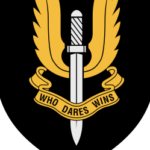Wider military influence in schools in Scotland
This page contains evidence submitted to the Scottish Parliament’s Public Petitions Committee in 2016. See more about the Scottish petition calling for regulation of armed forces visits to schools, and other pages of evidence.
The UK military’s influence in schools in Scotland is not limited to visits by armed forces personnel. Other initiatives, which mostly take place during school hours, include: a wide range of school Cadet programmes; lesson resources produced by the armed forces; visits to military bases and museums; military-oriented alternative provision; and armed forces scholarships for those in S6 or Further Education colleges. The two main reasons the military ‘engages' with young people, and with schools in particular, which drive all but the last of the initiatives explored below, are armed forces recruitment and positive awareness-raising.
Return to the main petition page
Cadets in schools
Overview
There are currently eleven Combined Cadet Forces (CCFs) in the Highlands and eight in the Lowlands. All of them are in independent schools. There are currently no state school CCFs in Scotland; Knox Academy’s was the last, and it was disbanded in 2010 because of low membership (down to 20 students from a peak of 80), a staff volunteer shortage, and because of the problem of storing - and training with - rifles on school premises was “beyond resolution”. There was interest in expanding the CCF in state schools in Scotland as long ago as 2006, at least as pilots, but this did not go ahead.
The UK government hope that some of the 145 new CCFs that are to be set up between 2015-2020 under the £50 million second phase of the major expansion of the CCF in disadvantaged state schools will be in Scotland, but this is dependent on Education Scotland consent. Scotland’s Children’s Minister Eileen Campbell told the MoD that, “there is no tradition of cadet units within state schools” in Scotland, and implied that Education Scotland would prefer to use the funding on offer, “flexibly to support Scottish approaches and practices”. The discussion is likely to continue. A senior Scottish Government figure, as well as MSP Chic Brodie and the EIS (Scotland’s largest teachers’ union) all expressed concern about the proposal, but Nicola Sturgeon and Scottish Conservatives criticised claims that the CCF expansion amounts to a cynical armed forces recruitment initiative. The UK government previously claimed in 2006 that the devolution of education in Scotland would not be an “obstacle” to expanding the CCF into state schools there, as Cadets are overseen by the MoD.
There may also be some Army Cadet, Sea Cadet or Air Cadet units based in schools in Scotland – around 170 such units exist in schools throughout the UK, some of which are purely for students at the school, and do activities in school time, and are therefore not that different from the CCF. (Source: draft MoD Youth Engagement Review 2012, obtained by FOI request in July 2012. Available from ForcesWatch on request) In 2014 Knox Academy was considering hosting an Army Cadet Force in this way.
In addition, Cadets already, ‘deliver parts of the Curriculum for Excellence as part of the cadet experience programme.’ Phil Denning, Assistant Director of Education Scotland commented in 2015 that, “what we are starting to see happen at the moment is that organisations – like the cadets – are presenting ‘learning offers’, which link the cadet syllabus much more explicitly with the Curriculum for Excellence…They[teachers]’re saying, we don’t have the time or resources to do this on our own. We are saying, you’re not expected to do this on your own, partnerships are built into the Curriculum for Excellence from the outset. It’s about saying education policy does not end with the school day.’’ The Army Cadet Force provides training to 150 Scottish state school students through its 'Linked Detachment Programme’, with eleven projects in six schools. Moreover, the Army Cadet Force‘s 'Outreach' programme for 13-15s who are excluded, 'socially disengaged', or who have behavioural problems involved 137 students in Scotland in 2014-15, which was 15% of total number of students engaged across the UK – disproportionately high given that Scotland only comprises 8.4% of the UK population.
Recruitment and positive awareness-raising agendas
Though the UK government and others – including the Scottish Conservatives – have denied the recruitment function of the Cadets, but there is considerable evidence to the contrary. The MoD acknowledged in 2014 that, “Cadet units are beneficial to both society and for recruitment into the Armed Forces, that is why we want to increase the number of them.” Although only 2% of ‘other ranks’ in the armed forces in 2014 said that they had been in the CCF, 20% of officers said they had been. On average 23% of the armed forces in 2014 had been in the Army Cadet Force, Sea Cadet or Air Cadets; as mentioned above, some of these units may have been attached to schools in a similar way to CCFs. Between 2007-10, out of the 82,000 young people leaving the Army Cadet Force and CCF, 4618 (5.6%) joined either the Regular armed forces or the Reserves, a substantial proportion of the total number of young people who joined the armed forces in that period.
The MoD state in their 'Cadet 2020 Vision' that, 'Cadets who show an interest (at the appropriate point) in pursuing a career within the Services (Regular or Reserve) are provided with timely, accurate and comprehensive information and career advice in order to enable them to make an informed choice.' Similarly, Scottish Conservatives’ education spokesperson Liz Smith claimed, regarding the debate around the expansion of Cadets into disadvantaged state schools, that the armed forces, “are very careful about how they inform children about what they do.” However, there is anecdotal evidence that cadets are not well informed about the risks, legal restrictions and ethical dilemmas faced in the armed forces.
Bullying and sexual abuse
Other concerns regarding Cadets in schools include cases of severe bullying, and sexual abuse. Edinburgh Academy’s CCF gained national infamy in 2014 when three members were charged with a range of abuses against other cadets. And between 2011-14 the MoD paid out more than £2 million in out-of-court settlements as a result of claims of sexual abuse against young cadets, including in the CCF.
Curriculum activities
Recently the armed forces have increased their involvement with science, technology, engineering and mathematics (STEM) education. These activities are delivered by various parts of the armed forces including Army Youth Engagement and British Army Outreach, RAF Youth Engagement, the Royal Navy and the Armed Forces Careers Offices; and also by the MoD's Defence Engineering organisation and a 'Roadshow Team' which is run by BAE Systems and works with the RAF and Navy to deliver activities in schools. The MoD are also developing partnership memorandums of understanding with a range of other STEM providers.
Provision of lesson resources
The armed forces frequently provide lesson resources to schools. In England, notable examples include the Army’s First World War resources for secondary schools, and the UK Government’s controversial ‘British Armed Forces: Learning Resource 2014’. It is not known which resources have been offered to schools in Scotland, nor how much they have been used.
School visits to military bases
No recent overall data for visits to military bases by schools in Scotland is available, but one example is the day hosted for local schools by RAF Lossiemouth in March 2015, ‘designed to introduce young people to the way of life and ethos of the Royal Air Force.'
School visits to military museums
3650 students in Scotland took part in school trips to the Royal Highland Fusiliers Museum, the Gordon Highlander Museum, and the Black Watch Museum in the most recent year for which data is available. The total number of visits will be significantly higher, as data is not disaggregated for the numerous other military musems in Scotland. As part of visits students are sometimes allowed to play with decommissioned weaponry. Education Scotland states: ‘These museums and archives are a valuable source for teachers and students.'
Military Ethos initiatives
The UK Government launched a ‘Military Ethos in Schools’ programme in 2012, designed to raise the attainment of disadvantaged students in state schools in England by promoting military-style initiatives such as the CCF, and by bringing in armed forces veterans as teachers and alternative provision leaders. The programme has caused concern among teachers’ unions, faith and campaign groups alike.
As mentioned above, the UK government want the second phase of the Military Ethos programme’s CCF expansion to include disadvantaged state schools in Scotland. In addition, one of the ‘alternative provision with a military ethos’ organisations – SkillForce - already works in schools in Scotland (though it is funded separately from the Military Ethos in Schools programme). An SNP Defence spokesperson recently referred to it as a close working relationship with Education Scotland. Another military ethos alternative provision, Commando Joes, has started expanding from England into Wales, and its director has stated that he wants to expand across the whole of the UK.
Armed forces scholarships
Armed forces scholarships pay 16/17 year-old students during their final years of study at school or college, committing them to joining the armed forces as an officer after their school/college or university studies. Students can change their minds, but must pay back the money if they do so. It is not known how many sixth-year students in Scotland are in receipt of one of these.
Conclusion
Given the UN recommendation to the UK government that it ensures schools make peace education part of the curriculum, which could apply to schools in Scotland given that Foreign Policy is not devolved, the major increase in the military’s influence in Scottish schools between 2003-11 and the lack of comparable peace education in the Curriculum for Excellence, raises serious questions.
Return to the main petition page






